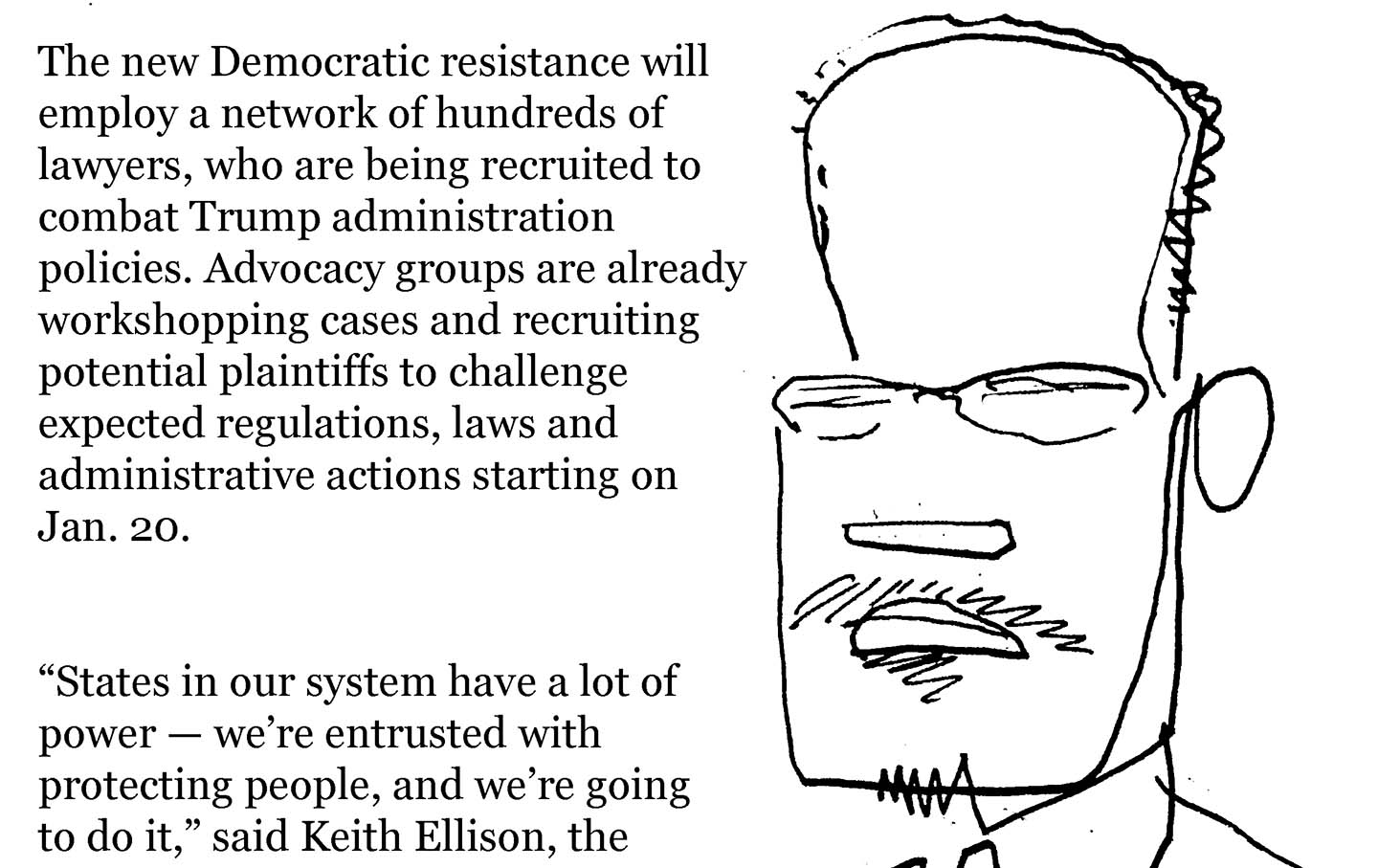The Press Can’t Wait to Do 2016 All Over Again
Months out from campaign season, the political media is already trotting out all the same old bullshit that got us into this mess.
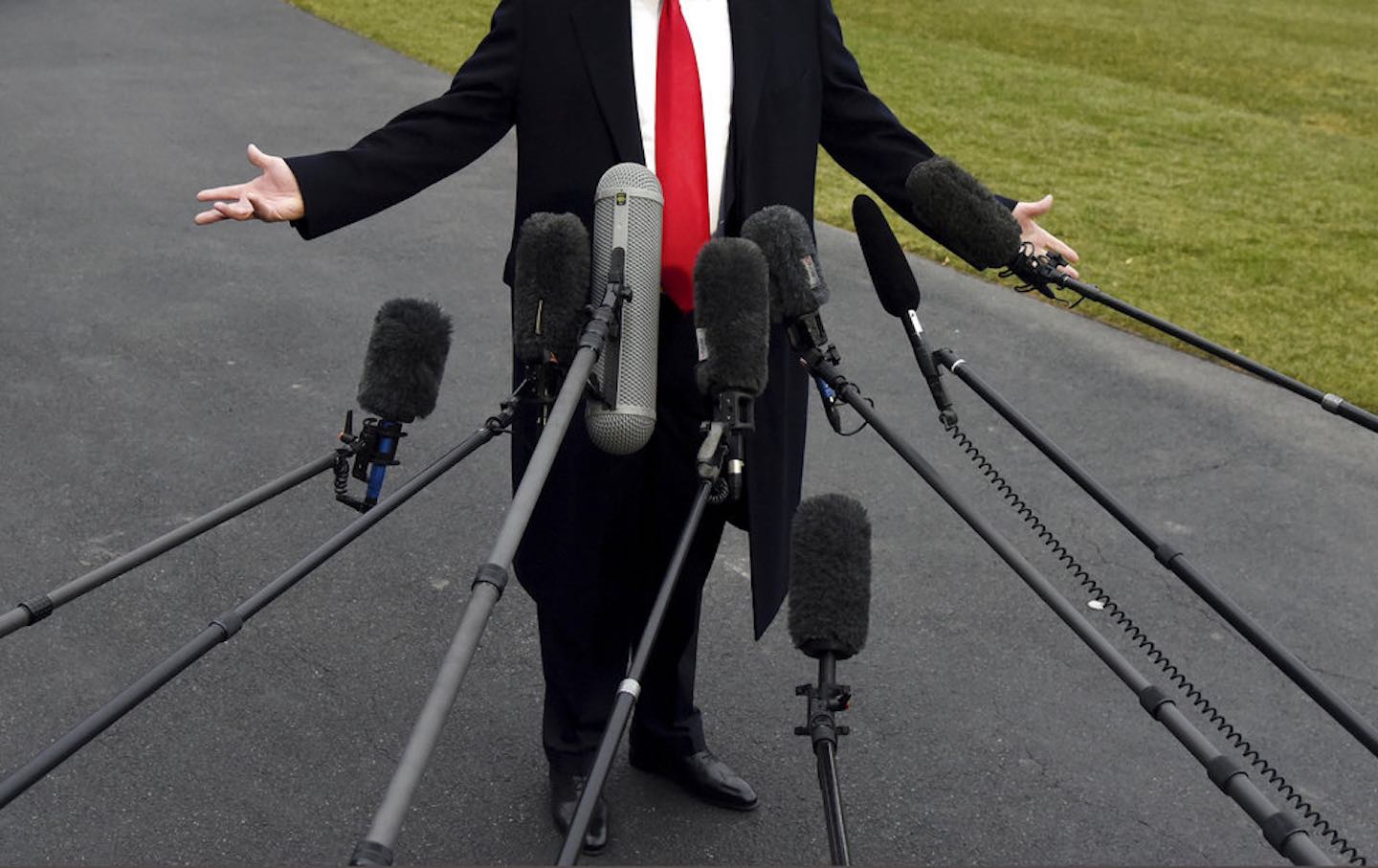
We’re still nearly half a year out from the formal onset of Campaign 2024, but worry not: Our mainstream political press is primed for action. Before a single debate is convened, or a high-school gym is booked for Iowa caucus night, we’re being assailed with the familiar lullabies of elite pundit consensus: Donald Trump is a spirit animal of the aggrieved white working class of the nation’s interior; every Trump-branded Truth social post, rally tantrum, and random utterance demands exhaustive real-time cable TV forensics; and ordinary voters are curiously jacked up on all things related to the coup-plotting autocrat’s third run at the presidency.
Never mind that it could well be that the American voting public has grown more Trump-obsessed thanks to the labors of a media complex that obsessively chronicles Trump’s tribulations and pending trials, from private jet liftoffs to courthouse press scrums to revival-style MAGA rallies. That level of self-awareness has long been anathema to political reporters and our pundit caste. So instead we are witnessing the old refrains from 2016 dressed up as fresh reporting and analysis, as though the last seven years of American political history simply hadn’t happened. Kicking things off in suitably purblind fashion is New York Times columnist David Brooks, who comes bearing the stunning insight—stop me if you’ve heard this one before—that Trumpism is a potent form of class resentment, sublimated through the status-deprived heart of the non-college-educated white electorate.
Trump’s unique political gift, Brooks argues, comes from the recognition
that it’s not the entrepreneurs who seem most threatening to workers; it’s the professional class.… If distrustful populism is your basic worldview, the Trump indictments seem like just another skirmish in the class war between the professionals and the workers, another assault by a bunch of coastal lawyers who want to take down the man who most aggressively stands up to them. Of course, the indictments don’t cause Trump supporters to abandon him. They cause them to become more fiercely loyal.
This analysis is, to begin with, not supported by any actually existing socioeconomic data. As Vox reporter Zack Beauchamp notes in a thorough dissection of Brooks’s argument, the notion that non-college-educated voters thronged as one to Trump is simply not true. Joe Biden carried non-college-educated voters over Trump in the last election; Trump only ran up margins against Biden among factions within that demographic: white voters, and, significantly, those earning more than $100,000 a year. The former trend, bolstered by a raft of supporting research, suggests that racial animus figures prominently in the Trump movement, while the latter plainly indicates that the core class tensions of the kind Brooks describes—rooted in a sense of a broad middle-class birthright purloined by a scheming coastal knowledge elite—aren’t as straightforwardly proletarian as he suggests.
It’s indeed long been the case that the class antagonism stoked by the modern right has occurred within competing ownership factions, with comfortably well-off entrepreneurs, market brokers, and rentiers rebelling upward against the depredations of an establishment corporate oligarchy and downward against a putatively undisciplined, entitlement-addicted, and racially suspect working class. Going back to the great media bias wars of the late 1960s and early 1970s, Republican propagandists have cannily fomented owner uprisings against a technocratic managerial elite. As one network TV vice president told Edward Jay Epstein in his 1973 study News from Nowhere, Spiro Agnew’s broadsides against a uniform liberal ethos in the TV industry were so much class-inflected shadow play. In reality, media power and ad revenue overwhelmingly tilted in favor of local network affiliates, and, as the vice president noted, “Affiliates tend to be owned by people in another business—newspapers, automobile dealers, Coke distributors—and run by salesmen and former announcers. Their politics are Republican, their ideals are pragmatic and their preoccupation with return on invested capital and the safety of their license to broadcast is total.”
Brooks notes, correctly, that the workforce in today’s press is a preserve of elite cultural privilege. But that has little to do with the actual programming and editorial direction within most flagship media properties; the old model of aggrieved affiliate ownership still holds decisive sway within a TV industry where Fox and Sinclair are the leading reapers of market share. What’s more, what might be called the LLC strain of rebellion on the right—the revolt of the real estate agents and car dealership owners—is still very much at the vanguard of the MAGA movement, as the socioeconomic profile of participants in the January 6 insurrection clearly shows. For a concentrated dose of pure MAGA ideology, you’d be hard pressed to outdo a car dealers’ convention, as a bracing dispatch from Slate’s Alex Sammon recently demonstrated.
Brooks disregards all these inconvenient economic truths because they don’t fit his tidy fable of Trumpism as a fierce repudiation of the American meritocracy. It bears reminding that Brooks and his cohort of pundits continue to confect such fables on the basis of a complete misunderstanding of what “meritocracy” actually means. The term was coined by British socialist thinker Michal Young in 1958 to describe a regime of intelligence testing that drew potential leaders away from a working-class political movement—not as the featherbedding educational regime of a preexisting credentialed aristocracy. (Young’s novel introducing the concept, The Rise of the Meritocracy, 1870-2033, actually culminates in a violent workers’ revolution, an outcome that precisely none of the many American domesticators of the idea have ever seriously reckoned with.) Stripped of its own explicit class connotations, meritocracy is little more than a talking point that conveys the knowledge elite’s own anxieties about its own insulated class position—an all-purpose pundit fable in which the perennial challenge is to ritually acknowledge the hurt feelings of a vast, unknown, less-privileged population below it, and the only solution is to become, like David Brooks, a performatively chastened empath.
It is, in other words, a model of discourse over reward and punishment in the American political economy that entails no actual politics. It’s no wonder that the Americanized gloss on meritocracy and its follies continues to offer itself as the pundits’ explanation of first resort in the class politics of the Trump era—it goes to the very heart of their own class identity.
The same basic template of anti-politics drives the political press’s allied cottage industry in polarization porn: the tireless effort to depict—without ever substantively understanding, let alone resolving—the seeming cognitive, existential, and tribal divides that convulse our national political scene. If the merchants of the meritocracy lullaby are misbegotten empaths, then the narrators of polarization are sorrowful couples therapists, no longer confident that the national marriage can be saved, but determined to chronicle its breakdown without the divisive and intemperate language of fault-finding. My own hometown paper, The Washington Post, has furnished the most edifying recent proof text, in a dispatch from Cobb County, Ga., registering the reactions of a local Trump supporter and Biden backer to the news of Trump’s indictment last week on charges relating to the January 6 coup attempt.
Post reporters Sarah Ellison and Greg Jaffe are keenly attuned to every oversignifying cultural choice and classbound characteristic that their chosen dramatis personae summon forth. The Biden supporter, Jenny Peterson, who works for her financial-adviser husband, listens to news of the indictment on NPR as she’s out getting an order of Mexican food for her family; her Trump-loving counterpart, Jerry Ramsey, the owner of a landscaping firm, rolls out of bed the next day to see Fox News shouting head Mark Levin tell him what he wanted to hear: “This indictment is crap!” It’s a refrain, the Post reporters ruefully note, that “spoke to Ramsey’s sense of outrage and fear for the country.” Together, the Cobb County partisans evoke a whole panoply of disturbed emotion, as Ellison and Jaffe force them into the same procrustean bed of dead-end political passion. Not only do Ramsey and Peterson “both live in Cobb County, a politically contested Atlanta suburb in a state at the center of the legal battle over the 2020 election,” they also hold that “the legal proceedings and the 2024 election would render a verdict not just on Trump, but on the future of American democracy.”
The lamentable divergence of belief and opinion ramifies through all their civic operating systems, the reporters lament:
They voted differently, took in information through different outlets and had radically different views of the threats to the country’s democracy.… If anything, it felt as if the two sides—those appalled by Trump and those who adore him—were growing ever more suspicious of each other. The divisions were reflected in opinion polls, which showed that Americans held diametrically opposite views of whether Trump should face criminal charges for his role in the attack on the Capitol.
Then, in a metaphor-mangling crescendo, we learn the awful truth: “The poles of American politics were on a collision course.”
This labored dirge for lost comity is another wishful elevation of process over substance. Nowhere does the piece engage with the veracity of the charges before Trump; instead, the point is that the newest indictment is yet one more thing that the polarized electorate refuses to agree on. Given that it pivots on criminal offenses documented in the public record, it’s hard to know just what the basis for any hypothetical post-partisan concord could be, beyond the supposition that Trump may have “committed some light treason,” in the immortal formulation of Arrested Development patriarch George Bluth. Certainly either outcome of Trump’s latest criminal proceeding—conviction or exoneration—is certain to accelerate the baleful trends of partisan allegiance in our beleaguered republic. As a result, the central question entertained in the piece—will this court case continue to stoke the ravening forces of “polarization”?—is something between a gargantuan banality and a monumental category error: Of course it fucking will.
Popular
“swipe left below to view more authors”Swipe →But as in the meritocracy shtick of Brooks et al., the point here isn’t logic or compelling political analysis; it’s once more the emotivist elite-media project of wishing away political conflict. The self-styled managers of our political discourse are following directly in the footsteps of an earlier generation of self-styled journalistic managers of labor conflict. As my erstwhile colleague at The Baffler Thomas Frank long ago noted, the neoliberal press could come away with only one crucial lesson from work stoppages: Strikes are sad. They are the breeding grounds of, yes, polarized visions of how to earn a livelihood in America, pitting a picket-walking brother against a scabbing one, fomenting rancor at working-class dinner tables, and making strife in the smoothly managed sanctums of market capitalism. The sad-making tenor of this brand of labor reporting, Frank notes, works to muscle any notion of worker agency—the animating principle of what he calls the “classic labor reporting” of the 1930s and ’40s—out of the picture altogether. Instead, the proper historical prime mover is the now-dangerously embattled agora of the global market:
We seem to have lost altogether the sense of democratic possibility that animates unionism. Even those who are sympathetic to the victims of downsizing (and, hey, who isn’t?) understand workers as victims, not as historical actors capable of reversing the whole thing. Things that happen to us are accidental; things that happen in the economy as a whole are inevitable. Wages are stagnating even while the economy grows? Well… the market works in mysterious ways. Economics is something we complain about; the power to change our lives is a role we reserve exclusively for business. Louis Adamic entitled his 1931 history of class conflict in the United States Dynamite; a contemporary treatment of the subject would be called Tears.
It’s uncanny how readily you can substitute “politics” and its allied elite-approved word pictures for the labor terminology in Frank’s structural critique of the sad-strike mantra, and emerge with the same analysis embedded in the countless stories composed in the Ellison-Jaffe vein. Voters are powerless to intervene in the spectacular confrontations of law and political order wafting far above their heads. They stubbornly resist that complaisant destiny by recurring to the tribal household gods still irrelevantly insisting that outcomes matter—that their anger, agency, and civic outrage should not submit to the wise, impartial management of gatekeepers and designated interlocutors.
In other words: Polarization is sad, just like meritocracy is a great pundit-engineered civic misunderstanding. Be prepared for a steady torrent of this sort of bullshit, as the next campaign cycle lurches into gear, and our political reporters and pundit caste continue to strain mightily to keep us from learning to call things by their true names.
We cannot back down
We now confront a second Trump presidency.
There’s not a moment to lose. We must harness our fears, our grief, and yes, our anger, to resist the dangerous policies Donald Trump will unleash on our country. We rededicate ourselves to our role as journalists and writers of principle and conscience.
Today, we also steel ourselves for the fight ahead. It will demand a fearless spirit, an informed mind, wise analysis, and humane resistance. We face the enactment of Project 2025, a far-right supreme court, political authoritarianism, increasing inequality and record homelessness, a looming climate crisis, and conflicts abroad. The Nation will expose and propose, nurture investigative reporting, and stand together as a community to keep hope and possibility alive. The Nation’s work will continue—as it has in good and not-so-good times—to develop alternative ideas and visions, to deepen our mission of truth-telling and deep reporting, and to further solidarity in a nation divided.
Armed with a remarkable 160 years of bold, independent journalism, our mandate today remains the same as when abolitionists first founded The Nation—to uphold the principles of democracy and freedom, serve as a beacon through the darkest days of resistance, and to envision and struggle for a brighter future.
The day is dark, the forces arrayed are tenacious, but as the late Nation editorial board member Toni Morrison wrote “No! This is precisely the time when artists go to work. There is no time for despair, no place for self-pity, no need for silence, no room for fear. We speak, we write, we do language. That is how civilizations heal.”
I urge you to stand with The Nation and donate today.
Onwards,
Katrina vanden Heuvel
Editorial Director and Publisher, The Nation
More from The Nation
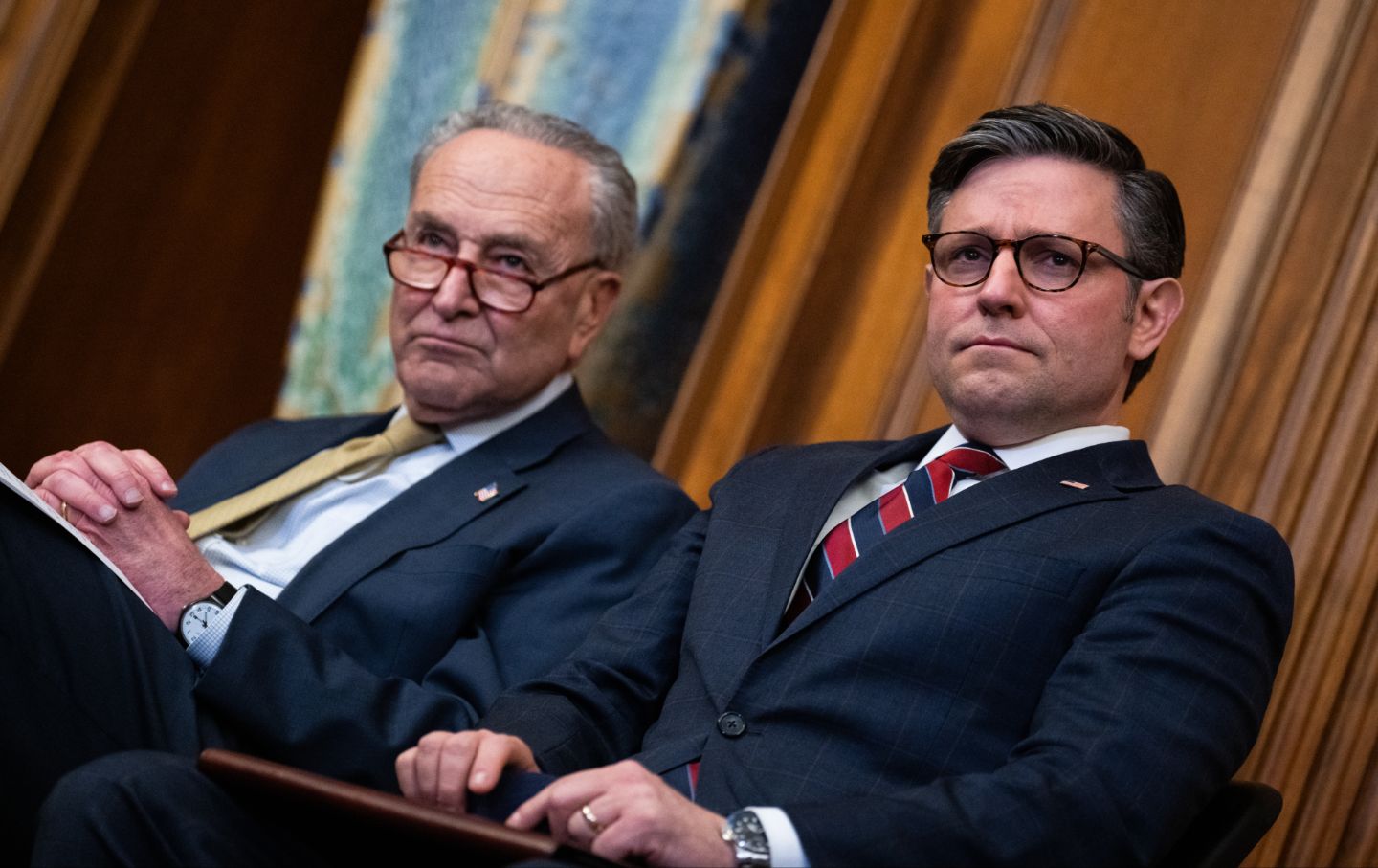
Democrats Must Do Everything They Can to Block the Dangerous Nonprofit Bill Democrats Must Do Everything They Can to Block the Dangerous Nonprofit Bill
The House passed a bill aimed at giving the government sweeping powers to crush nonprofits and attack supporters of Palestine. Democrats need to stand firmly in its way.
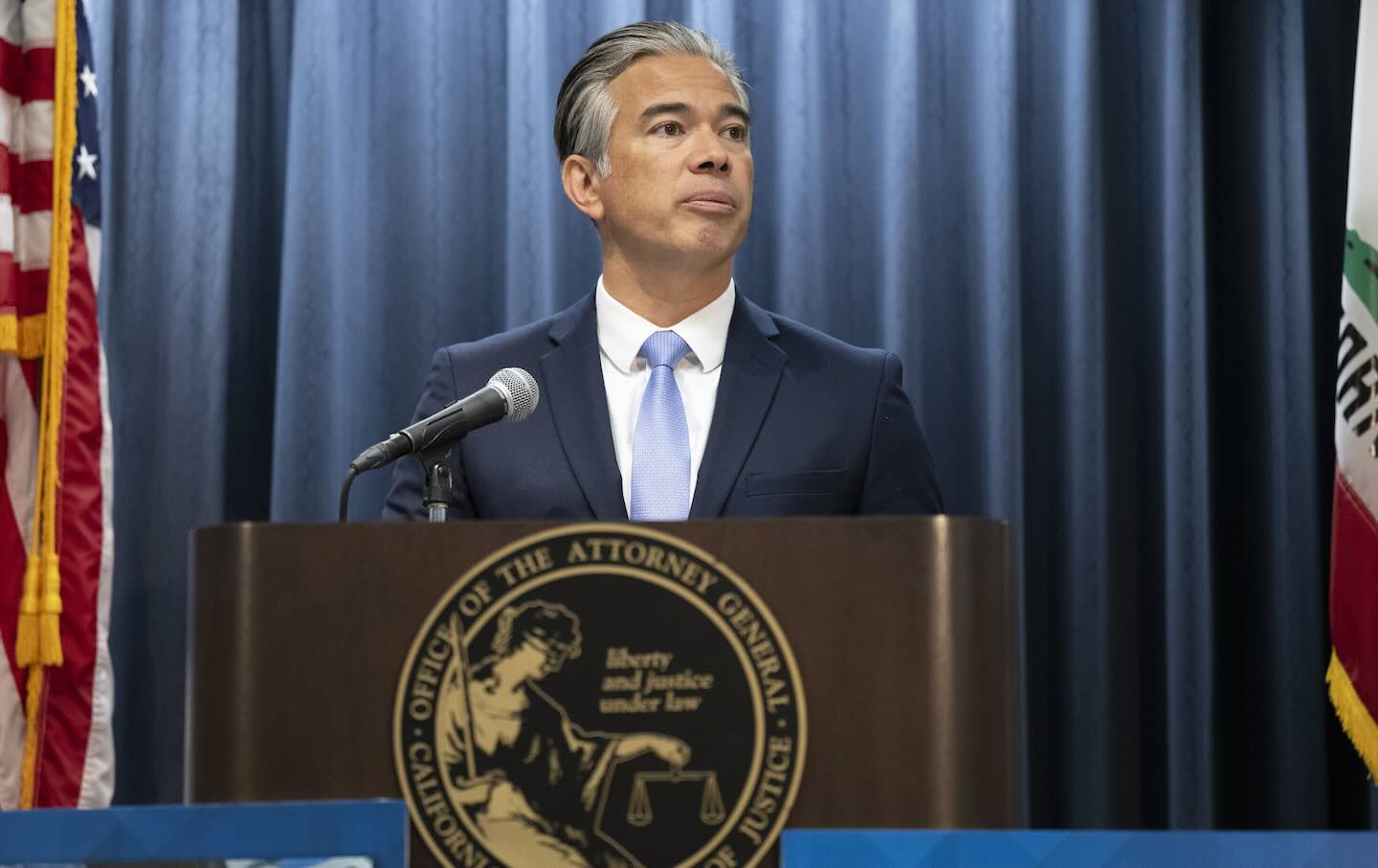
California Is Ready to Go Toe to Toe With Trump 2.0 California Is Ready to Go Toe to Toe With Trump 2.0
“We’ve thought about all the possibilities, and have prepared for every one of them,” said AG Rob Bonta, “and are ready to take action when there’s any unlawful activity.”
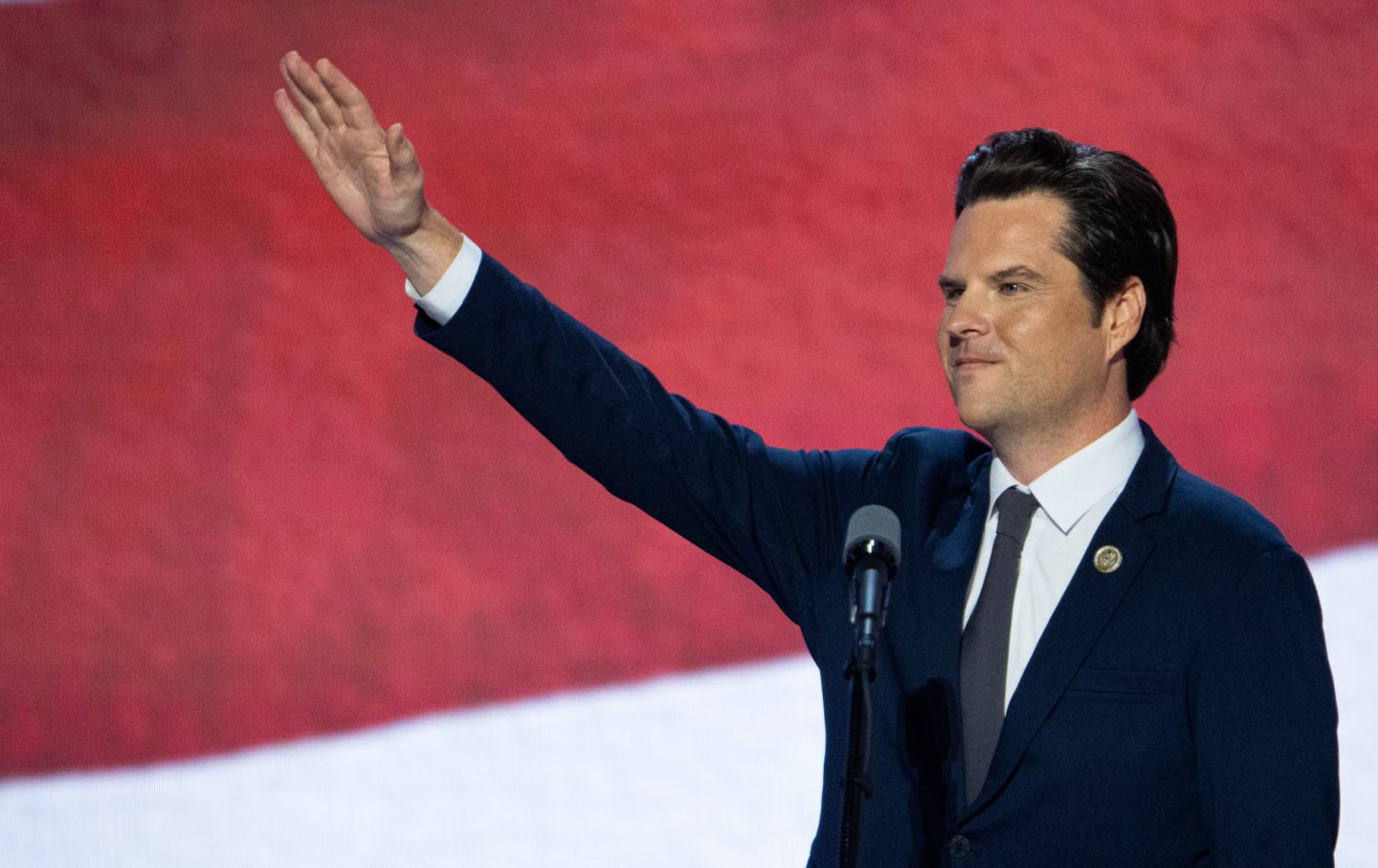
BREAKING: Matt Gaetz Quits, and Journalism Still Matters—a Lot BREAKING: Matt Gaetz Quits, and Journalism Still Matters—a Lot
Forty-five minutes after CNN contacted Trump’s attorney general nominee about additional allegations of sexual misconduct, he was done.

The Red Wave Didn’t Hit Statehouses in This Election The Red Wave Didn’t Hit Statehouses in This Election
State-level Democrats largely held their ground, even scoring key victories in battleground states—and under Trump, that’s going to matter.
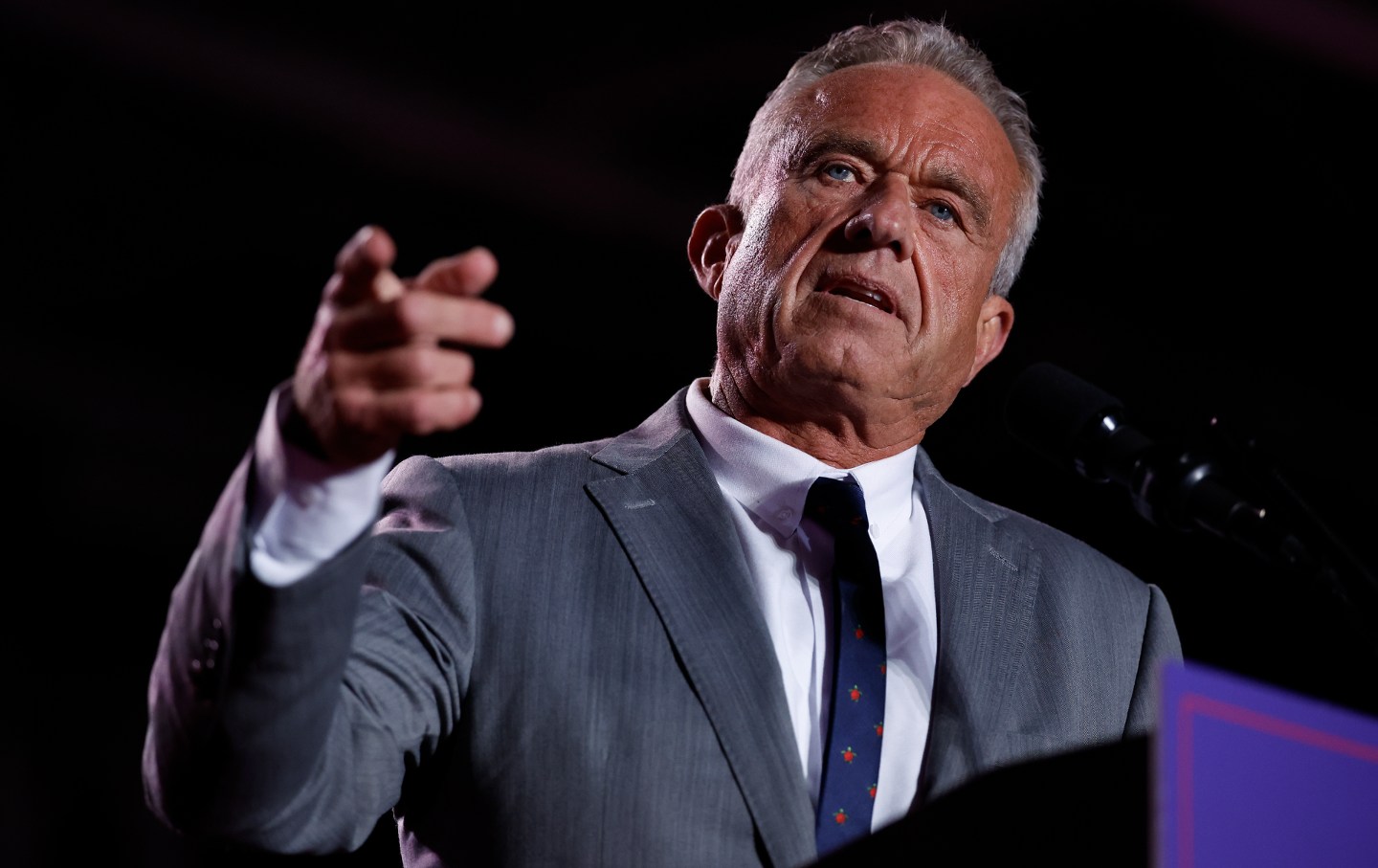
How Nominally Pro-Choice RFK Jr. Can Get Anti-Abortion Groups to Back His HHS Nomination How Nominally Pro-Choice RFK Jr. Can Get Anti-Abortion Groups to Back His HHS Nomination
He can pick a strident abortion opponent like Roger Severino, who wrote the Project 2025 chapter on HHS, as his number two.

